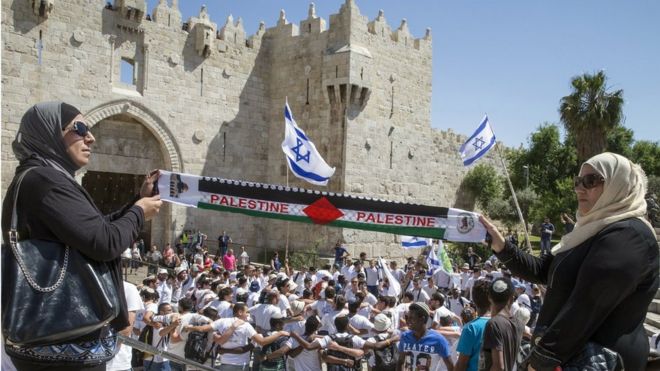Original post: Samuel Thrope
 Decades of on-off talks between Israel and the Palestinians have failed to produce peace
Decades of on-off talks between Israel and the Palestinians have failed to produce peaceAs support for a two-state solution to their conflict declines among Israelis and Palestinians, a different approach to finding a peaceful settlement is being proposed.
Called "Two States - One Homeland", the group, led by Israeli journalist Meron Rapoport and Palestinian politician Awni Almashni, is advocating the creation of an Israeli-Palestinian confederation.
They say that their plan, now picking up public and official backing, can solve the difficult issues - Israeli settlements, the right of return for Palestinian refugees, and the fate of Jerusalem - that have scuttled past negotiations.
The "clinical death" of the Oslo Peace process, inaugurated by Israeli Prime Minister Yitzhak Rabin and Palestinian leader Yasser Arafat in 1993, and increasing violence "bring fertile ground for new ideas," said Mr Rapoport, a veteran journalist based in Tel Aviv.
The new proposal can succeed because "it reflects reality and the deep desires of both sides", he says.
EU model
The Two States - One Homeland plan resembles the familiar two-state solution in that it calls for the creation of an independent state of Palestine in the West Bank, Gaza, and East Jerusalem, beside Israel, along the pre-1967 boundaries.
These two states, however, would not be entirely separate. They would deal jointly with security, the economy, and infrastructure, and would be equally subject to a supreme court of human rights. Jerusalem would serve as a shared capital.

The plan also envisions a separation of citizenship and residency meant to satisfy the historical and spiritual connection both Jews and Palestinians feel to the entire Holy Land.
Like the similar system in the European Union, citizens of one country would be free to reside in the territory of the other and live under its laws.
Jewish settlers could remain in the West Bank, the heartland of the Bible, just as Palestinian refugees from the 1948 Middle East war, who would be granted citizenship in the Palestinian state, could return to live in their former communities (though not in their original homes).
Opposition
Two States - One Homeland now counts more than 100 Palestinian public figures as supporters, and Mr Almashni says it is making inroads among the leadership of the Palestinian Authority.
The Israeli side, while also engaging with politicians, is taking a more grassroots approach. According to Meron Rapoport, over the past six months the group has held nearly weekly home meetings with Israelis from across the country's political spectrum.
 Image copyright Samuel Thrope
Image copyright Samuel Thrope
Meron Rapoport (c) and Eliaz Cohen (l) from Kfar Etzion settlement hold a 'One Homeland' meeting in Ofra settlement
It has garnered thousands of followers on social media and enlisted scores of volunteers.
The group has also encountered opposition. Its inaugural public conference last June was moved from the Palestinian city of Beit Jala to nearby Jerusalem after Palestinian supporters of the Boycott, Divestment and Sanctions movement threatened to disrupt the gathering.
While opponents claim that any co-operation with Israelis is tantamount to normalising the occupation, Mr Almashni, himself the child of refugees, disagrees.
"Normalisation means living with the occupation, but this relationship with Israelis is proposing the end of occupation," said the long-time Fatah party member.
A crucial element of the initiative is its attempt to cut across calcified political divisions between left and right within Israeli society.
"Today, what is called the 'peace camp' talks only to itself. It sees settlers and the entire right-wing as a kind of enemy," said Mr Rapoport, noting that this strategy has only resulted in failure.
Instead, Two States - One Homeland is actively reaching out to settlers for support.
'More just'
Bar Ilan University political scientist Menachem Klein, a veteran of Israeli-Palestinian negotiations, is more sceptical.
Not only is the initiative less detailed and enjoys less international support than the two-state solution, he said, but the idea of allowing Jewish settlers to remain in the West Bank in return for letting Palestinian refugees settle in Israel is unpopular.
 Image copyright Samuel Thrope
Image copyright Samuel Thrope
Awni Almashni sees the project as a fair solution to the Palestinian refugee issue
The settlements are considered illegal under international law, though Israel disputes this. UN General Assembly resolutions, meanwhile, endorse a Palestinian right of return.
"For the Palestinian public it is difficult to accept this exchange," he added. "It's hard for me to accept it."
Mr Almashni, while not legitimising the settlements, is pragmatic.
"The Palestinians have already accepted the two-state solution, which does not include the return of refugees. This project proposes the return of refugees. It's not completely just, but it's more just."
Samuel Thrope is an American journalist and translator based in Jerusalem. His translation of Jalal Al-e Ahmad's The Israeli Republic was published in 2013.
The settlements are considered illegal under international law, though Israel disputes this. UN General Assembly resolutions, meanwhile, endorse a Palestinian right of return.
"For the Palestinian public it is difficult to accept this exchange," he added. "It's hard for me to accept it."
Mr Almashni, while not legitimising the settlements, is pragmatic.
"The Palestinians have already accepted the two-state solution, which does not include the return of refugees. This project proposes the return of refugees. It's not completely just, but it's more just."
Samuel Thrope is an American journalist and translator based in Jerusalem. His translation of Jalal Al-e Ahmad's The Israeli Republic was published in 2013.
No comments:
Post a Comment